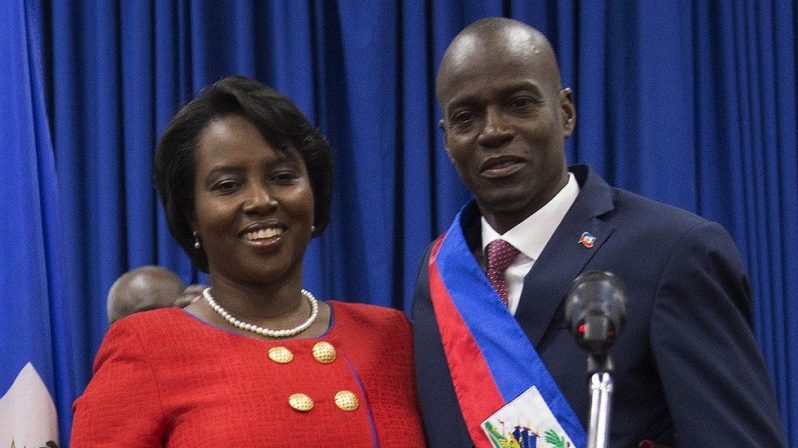A US delegation is due to visit Haiti to assess the security situation there following last week’s assassination of President Jovenel Moïse.
The team will also meet three Haitian politicians, each of whom is claiming to be the country’s legitimate leader.
Moïse, 53, was killed at his Port-au-Prince residence on 7 July, by 28 foreign mercenaries including retired Colombian soldiers, Haitian police say. His wife was injured in the attack, and then flown to the US for treatment.
Martine Moïse later described the moment assassins “riddled” her husband with bullets after bursting into their home in the middle of the night.
She said the attack happened so quickly, her husband Jovenel was unable to “say a single word”.
After the attack, Haiti’s authorities Haiti’s authorities asked the US and the UN to send troops to the country to protect key infrastructure.
President Joe Biden’s administration initially rejected the request – but has now decided to have a closer look at the situation.
Among the members of the American delegation are senior security and justice officials, US media report.
Moïse had been president of Haiti, the poorest nation in the Americas, since 2017. His time in office was rocky as he faced accusations of corruption and there were widespread demonstrations in the capital and other cities earlier this year.
Parliamentary elections should have been held in October 2019 but disputes have delayed them, meaning Moïse had been ruling by decree. He had planned to hold a referendum on the proposed constitutional changes this September.
In February this year, on the day the opposition wanted him to leave office, Moïse said an attempt to kill him and overthrow the government had been foiled.
It is still unclear who organised Wednesday’s attack and with what motive. A number of questions remain unanswered, including how the alleged assassins were able to enter the property. Moïse’s bodyguards are due to be questioned later this week.
One prominent opposition figure has openly expressed scepticism over the current version of events. Former Haitian senator Steven Benoit told local station Magik9 radio on Friday it was “not Colombians who killed him”, but did not provide evidence to back up his claims.
Haitian police have said the majority of the mercenaries was Colombian, while two were joint US nationals.
Seventeen of the group were detained in the capital Port-au-Prince after a gun battle. Three suspects were killed by police, and eight others are still being sought.
Colombia’s government has pledged to assist Haiti with its investigation efforts.
Colombian police director, Gen Jorge Luis Vargas, said 17 former Colombian soldiers were thought to be involved.
The US state department, meanwhile, said it could not confirm if any of its citizens had been detained.
However, US and Canadian media are reporting that one of the dual citizens arrested, James Solages, 35, is from Florida and was a former bodyguard at the Canadian embassy in Haiti.
An investigating judge told local media that Solages and the other US citizen, named as Joseph Vincent, had said they were there as translators for the mercenaries.
“The mission was to arrest President Jovenel Moïse… and not to kill him,” Judge Clément Noël told Le Nouvelliste.
The constitution says the National Assembly should choose another President. But disputes meant that elections scheduled for October 2019 did not take place – and Moïse had been ruling by decree amid widespread protests.
Amendments to the constitution — not accepted by everyone — suggest the prime minister should take over.
But Haiti has both an interim prime minister, Claude Joseph, and a new appointee, Ariel Henry, who has yet to be sworn in.
Both are claiming to be in charge.
On Friday, a group of political parties signed a resolution proclaiming a new President – Joseph Lambert – with Mr Henry acting as his PM.
The situation is doing little to resolve the political and economic instability that has long plagued the nation. (BBC)



.jpg)











